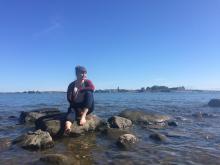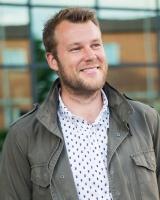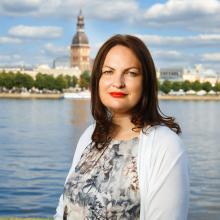Submitted by Tina M Swenson
on
The visiting lecturers in our department are passionate about language, and have devoted their careers to teaching it. Each of them have come to the UW as holders of visiting lectureships, paid for by both the government of their respective countries and the UW. Their term at the UW may be up to five years. This year, we have three new lecturers, and two who have taught at the UW for one year. So we thought it would be good to start out with some questions about their passion for language, and to get to know them better. We asked each lecturer five questions:
- How long have you been teaching your language?
- Why do you think students should study your language?
- Why did you choose to come teach at the University of Washington?
- What is your goal during your time at the UW?
- What do you like to do in your free time?
Hanna-Ilona Härmävaara
- In 2007 I started out as a high school teacher of Finnish and literature for native speakers in Finland. In 2010, I switched to teaching Finnish language and culture for foreigners at the University of Helsinki.
- I always say Finnish is not difficult, but different. Getting familiar with a language that is totally different from one’s mother tongue opens up a whole new world. Best of all, if you really want to learn to know the northern culture hidden behind all that silence in Finland, you need to know how to speak it.
- I love to teach abroad. It’s inspiring to work with highly motivated students who are eager to get to know my language and culture. Also, UW has a good reputation, so I’m excited to join the UW community.
- My goal is to create a nice community of people interested in everything Finnish. I also aim at providing a fun way of learning Finnish.
- As a stereotypical Finn, I love being out in the nature: hiking, biking, skiing, and spending time at seaside cottages. However, I’m a city person too. I enjoy going to different cultural events, meeting new people and doing urban exploring. And dancing! They call me MC Hammer-vaara for a reason.
Kristian Næsby
- I have been teaching Danish language and culture for seven years, six years at a Danish Folk High School in Denmark and one year at UW.
- Studying a different language gives you the opportunity to experience a different culture. And studying a different culture gives you a new perspective on your own. Understanding different cultures simply makes you a more knowledgeable, empathetic and interesting person. There is no downside!
- Studying Danish opens up the world for you, and gives you an edge, a unique profile in a difficult and competitive job market. Denmark is a country with a strong humanistic tradition and with a large number of world renowned international companies. Furthermore, Danish culture, literature and cinema have since the 1990s become internationally popular -- a powerhouse. Come join the Danish Community.
- The UW is one of the most important universities in North America for Scandinavian Studies. There is a strong academic community, great colleagues and a beautiful campus. It has been a dream of mine for many years to live and work outside of my home country, Denmark. And to have the opportunity to teach young Americans at The University of Washington about Denmark, Danish culture and language is an honor and a privilege.
- I work as hard as I can to provide high quality education every single day, both in language classes and teaching Danish culture. I want it to be eye opening, challenging and fun to be in a Danish classroom. My goal is to make as many students as possible even more curious about Denmark, and maybe even go on to study abroad in Denmark.
- I love living in Seattle and getting to know my new city, and I look forward to do a lot more exploring in the Pacific Northwest, and the rest of North America.
Aiga Veckalne
- Ever since 2001, when I graduated from the University of Latvia with a degree in Baltic Linguistics, I have been active in the in the field of Latvian language: teaching Latvian to foreigners, editing and translating, working as an interpreter, conducting workshops on the Latvian language and its practical application, as well as appearing on radio and TV to speak about the importance of the Latvian language and the development and strengthening of a cultivated sensibility regarding our rich linguistic heritage.
- Latvian is a unique language in several aspects – it is one of only two living Baltic languages with many archaic forms and features, lexical richness and a very interesting grammar system. There are 1.7 million native Latvian speakers in Latvia and abroad, yet Latvian plays an important role in European Union multilingual language policy as it is one of the official languages of the EU. Learning Latvian opens the door to its diverse culture, extraordinary history, amazing folklore, multidimensional literature and the nation’s mentality. Everyone who learns Latvian can help to develop and maintain this language, as well as creating content and translating Latvian texts into foreign languages.
- I was attracted to the UW because of the university’s distinguished reputation in both teaching and research, as well as its role, unique in North America, as a flagship for Baltic and Scandinavian Studies. The department offers the unusual opportunity to promote awareness of the language, literature, traditions and history of Latvia. I would truly relish the privilege of serving in a modest way as a kind of Latvian cultural ambassador both within the University and as much as possible in the wider community outside of academia as well.
- I will do my best to show that language learning is not just about grammar, but about having fun, boosting creativity and analytical skills, as well as exploring a new world and broadening horizons, gaining new experience and meeting new friends. I want to inspire students and show them the beauty of Latvian language and the many layers of Latvian culture.
- Ever since I can remember, I have always been a bookworm, and it still remains one of my hobbies. I also love traveling and spending time outdoors (the Latvian seaside is a perfect place for hiking), as well as watching movies and journaling.
Eglė Žurauskaitė
- I started teaching Lithuanian language at Vilnius University when I got my MA degree in applied linguistics in 2013, but my parents say I have been teaching Lithuanian all my life, since I started to speak.
- It is not only because Lithuanian is oldest living Indo-European language. And it is not only because Lithuania became perfect place for startup companies after its Independence in 1993. It is also because when you learn Lithuanian, nothing will be impossible for you anymore! It gives you superpower!
- I wanted to challenge myself with a different teaching experience. For me, it is always interesting to see how native language influences language learning. Before teaching at the UW, I had taught many students from different Europe countries, but I had not taught many Americans. Moreover, I knew that UW language students are often highly motivated language learners. Who wouldn`t love to teach a class of motivated students?
- My goal for the time at UW is to gain more language teaching experience.
- When I have free time, I enjoy jogging and thinking about my students. I also like playing violin, reading and travelling.



